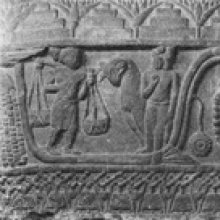Ra, Re, Rā, Râ, Ṟā, Ṟe, Ṟē: 22 definitions
Introduction:
Ra means something in Hinduism, Sanskrit, the history of ancient India, Marathi, Jainism, Prakrit, Hindi, biology, Tamil. If you want to know the exact meaning, history, etymology or English translation of this term then check out the descriptions on this page. Add your comment or reference to a book if you want to contribute to this summary article.
Images (photo gallery)
(+35 more images available)
In Hinduism
Vyakarana (Sanskrit grammar)
Source: Wikisource: A dictionary of Sanskrit grammarRa (र).—(l) the consonant र (ra), generally cited as रेफ (repha); the vowel अ (a) is added to र् (r) for facility of utterance: cf. T. Pr.' I.21 ; (2) short term (प्रत्याहृार (pratyāhṛाra)) for र् (r) and ल् (l); cf. उरण् रपरः (uraṇ raparaḥ), P. I. 1.51: (3) krt affix र (ra) applied to the roots नम्, कम्प् (nam, kamp) etc. in the sense of agent who is habituated to, or expert in the action expressed by the root; e. g, नम्रः, कम्प्रः (namraḥ, kampraḥ); cf. नमिकम्पिस्म्यजसकम-हिंसदीपो रः (namikampismyajasakama-hiṃsadīpo raḥ) P. III. 2. 167; (4) tad. affix र (ra) as a Caturarthika affix applied to the words headed by अश्मन्ः (aśmanḥ) e. g. अश्मरः (aśmaraḥ); cf. वुञ्छण् (vuñchaṇ) P. IV. 2. 80; (5) tad affix र (ra) in the sense of possession affixed to the words ऊष, सुषि, मुष्क, मधु (ūṣa, suṣi, muṣka, madhu), and तमस् (tamas) with अ (a) of तमस् (tamas) changed to इ; e. g. ऊषरम्, सुषिरम्, मधुरः, तमिस्राः (ūṣaram, suṣiram, madhuraḥ, tamisrāḥ) cf. Kas on. P.V. 2.107 and 114: (6) tad. affix र (ra) in the sense of diminution affixed to the words कुटी, शमी (kuṭī, śamī) and शुण्डाः (śuṇḍāḥ) e.g. कुटीरः, शमीर, शुण्डारः (kuṭīraḥ, śamīra, śuṇḍāraḥ); cf. Kas. on P. V. 3. 88: (7) tad. affix रक् (rak) which see below; (8) krt affix रक् (rak) which see below; (9) a term for द्विगुसमास (dvigusamāsa) in the Jainendra Vyakarana.
--- OR ---
Re (रे).—(रेश् (reś)) personal ending in Vedic Literature, substituted for त (ta) of the प्रथमपुरुष (prathamapuruṣa) (3rd pers.) plural in the Perfect tense; cf. लिटस्तझयो रेश् इरेच् (liṭastajhayo reś irec) P. III. 4.81.

Vyakarana (व्याकरण, vyākaraṇa) refers to Sanskrit grammar and represents one of the six additional sciences (vedanga) to be studied along with the Vedas. Vyakarana concerns itself with the rules of Sanskrit grammar and linguistic analysis in order to establish the correct context of words and sentences.
Purana and Itihasa (epic history)
Source: archive.org: Puranic EncyclopediaRa (र).—The letter ra means fire, strength, Indra. (Agni Purāṇa, Chapter 348),

The Purana (पुराण, purāṇas) refers to Sanskrit literature preserving ancient India’s vast cultural history, including historical legends, religious ceremonies, various arts and sciences. The eighteen mahapuranas total over 400,000 shlokas (metrical couplets) and date to at least several centuries BCE.
India history and geography
Source: Cologne Digital Sanskrit Dictionaries: Indian Epigraphical GlossaryRā.—(LP), abbreviation of Rājaputra, Rāuta, etc. Note: rā is defined in the “Indian epigraphical glossary” as it can be found on ancient inscriptions commonly written in Sanskrit, Prakrit or Dravidian languages.

The history of India traces the identification of countries, villages, towns and other regions of India, as well as mythology, zoology, royal dynasties, rulers, tribes, local festivities and traditions and regional languages. Ancient India enjoyed religious freedom and encourages the path of Dharma, a concept common to Buddhism, Hinduism, and Jainism.
Biology (plants and animals)
Source: Google Books: CRC World Dictionary (Regional names)Ra in Arabic is the name of a plant defined with Aerva javanica in various botanical sources. This page contains potential references in Ayurveda, modern medicine, and other folk traditions or local practices It has the synonym Illecebrum javanicum (Burm.f.) Merr. (among others).
Example references for further research on medicinal uses or toxicity (see latin names for full list):
· Flora Aegyptiaco-Arabica (1775)
· Philippine Journal of Science (1921)
· Systema Vegetabilium (1819)
· Flora Indica (1768)
· The Civil and Natural History of Jamaica in Three Parts (1756)
· Annales du muséum national d’histoire naturelle (1803)
If you are looking for specific details regarding Ra, for example health benefits, extract dosage, side effects, pregnancy safety, chemical composition, diet and recipes, have a look at these references.

This sections includes definitions from the five kingdoms of living things: Animals, Plants, Fungi, Protists and Monera. It will include both the official binomial nomenclature (scientific names usually in Latin) as well as regional spellings and variants.
Languages of India and abroad
Marathi-English dictionary
Source: DDSA: The Molesworth Marathi and English Dictionaryra (र).—The twenty-seventh consonant. It corresponds with R.
--- OR ---
ra (र).—f (The initial letter of raḍaṇēṃ To cry.) Crying, piping, blubbering. v kara. racā pāḍā or racēṃ gāṇēṃ or ra karaṇēṃ -gāṇēṃ -vācaṇēṃ -lāvaṇēṃ- sāṅgaṇēṃ-māṇḍaṇēṃ To wail and howl exceedingly: also to cry and pipe about childishly: also to exhibit cowardliness or weakness: also to piddle and poke; to dawdle and drag along lifelessly.
--- OR ---
rē (रे).—ind A particle of calling or addressing (a male); corresponding with Oh you! You fellow! Sirrah!
Source: DDSA: The Aryabhusan school dictionary, Marathi-Englishrā (रा).—f -
--- OR ---
rā (रा).—or-
--- OR ---
ra (र).—The twenty-seventh consonant. f Crying. racā pāḍā vācaṇēṃ To cry childishly.
--- OR ---
rē (रे).—ind A particle of calling (a male); Oh you!
Marathi is an Indo-European language having over 70 million native speakers people in (predominantly) Maharashtra India. Marathi, like many other Indo-Aryan languages, evolved from early forms of Prakrit, which itself is a subset of Sanskrit, one of the most ancient languages of the world.
Sanskrit dictionary
Source: DDSA: The practical Sanskrit-English dictionaryRa (र).—
1) Milk; हंसो हि क्षीरमादत्ते तन्मिश्रा वर्जयत्यपः (haṃso hi kṣīramādatte tanmiśrā varjayatyapaḥ) Ś.6.28.
2) The milky juice or sap of trees, exudation; resin; ये तत्क्षीरस्रुतिसुरभयो दक्षिणेन प्रवृत्ताः (ye tatkṣīrasrutisurabhayo dakṣiṇena pravṛttāḥ) Meghadūta 19; Kumārasambhava 1.9.
3) Water; तिर्यग्वाहाश्च क्षीरिणः (tiryagvāhāśca kṣīriṇaḥ) Rām.2.15.6.
-raḥ See क्षीरस्वामिन् (kṣīrasvāmin); क्षीराभिधाच्छब्दविद्योपाध्यायात्संभृतश्रुतः (kṣīrābhidhācchabdavidyopādhyāyātsaṃbhṛtaśrutaḥ) Rāj. T.4. 489.
-rā -rī Name of several plants containing a milky sap.
-rī A dish prepared with milk (Mar. khīra).
Derivable forms: ram (रम्).
See also (synonyms): kṣīra.
--- OR ---
Ra (र).—1 Fire.
2) Heat.
3) Love, desire.
4) Speed.
5) (In prosody) A syllabic foot (gaṇa) consisting of a short syllable between two long syllables.
6) The number 'forty'.
-rā 1 Giving.
2) Gold.
3) Amorous play.
-rī Going motion.
-ram Brightness, lustre.
Derivable forms: raḥ (रः).
--- OR ---
Ra (र).—1 Ā. (ramate, but Paras. when preceded by vi, ā, pari and upa; reme, araṃsta, araṃsīt P. raṃsyate, rantum, rata)
1) To be pleased or delighted, rejoice, be gratified; रहसि रमते (rahasi ramate) Māl 3.2; Manusmṛti 2.223; Uttararāmacarita 2.18.
2) To rejoice at, be pleased with, take delight in, be fond of (with instr. or loc.); लोलापाङ्गैर्यदि न रमसे लोचनैर्बञ्चितोऽसि (lolāpāṅgairyadi na ramase locanairbañcito'si) Me. 27; व्यजेष्ट षड्वर्गमरंस्त नीतौ (vyajeṣṭa ṣaḍvargamaraṃsta nītau) Bhaṭṭikāvya 1.2.
3) To play, sport, dally, amuse oneself with; राजप्रियाः कैरविण्यो रमन्ते मधुपैः सह (rājapriyāḥ kairaviṇyo ramante madhupaiḥ saha) Bv.1.126 (where the next meaning is also hinted); Bhaṭṭikāvya 6.15,67; रंरम्यते (raṃramyate) (atiśayena ramate) सरस- नागरिकण नाम्ना श्रीबिह्लणेन कविना क्षितिपालपुत्री (sarasa- nāgarikaṇa nāmnā śrībihlaṇena kavinā kṣitipālaputrī) Bil. Ch.48.
4) To have sexual intercourse with; सा तत्पुत्रेण सह रमते (sā tatputreṇa saha ramate) H.3; विशङ्कमाना रमितं कयापि जनार्दनम् (viśaṅkamānā ramitaṃ kayāpi janārdanam) Gītagovinda 7.
6) To remain, stay, pause.
6) To take rest, remain quiet.
7) To gladden, delight. -Caus. (ramayati-te) To please, delight, satisfy. -Desid. (riraṃsate) To wish to sport &c.; Śiśupālavadha 15.18.
Derivable forms: ram (रम्).
--- OR ---
Rā (रा).—2 P. (rāti, rāta) To give, grant, bestow; वयं ते अद्य ररिमा हि कामम् (vayaṃ te adya rarimā hi kāmam) Ṛgveda 3.14.5; स रातु वो दुश्च्यवनो भावुकानां परंपराम् (sa rātu vo duścyavano bhāvukānāṃ paraṃparām) K. P.7; Bhāgavata 8.3.19.
--- OR ---
Re (रे).—ind. A vocative particle; रे रे शंकरगृहाधिवासिनो जानपदाः (re re śaṃkaragṛhādhivāsino jānapadāḥ) Mālatīmādhava (Bombay) 3; रे रे चातक सावधानमनसा मित्र क्षणं श्रूयताम् (re re cātaka sāvadhānamanasā mitra kṣaṇaṃ śrūyatām) Bh.
Source: Cologne Digital Sanskrit Dictionaries: Shabda-Sagara Sanskrit-English DictionaryRa (र).—The twenty-seventh consonant of the Nagari Alphabet, corresponding to the letter R.
--- OR ---
Ra (र).—m.
(-raḥ) 1. Fire or Agni. 2. Heat, warmth. 3. Burning, scorching. 4. Love, desire. 5. Speed. f.
(-rā) 1. Giving. 2. Gold. f. (-rī) Going, moving. E. rā to give, or ram to play, &c., aff. ḍa .
--- OR ---
Rā (रा).—r. 2nd. cl. (rāti) 1. To get, to gain, to receive. 2. To give.
--- OR ---
Re (रे).—A vocative particle, but expressive of contempt or disrespect.
Source: Cologne Digital Sanskrit Dictionaries: Benfey Sanskrit-English DictionaryRā (रा).—ii. 2, [Parasmaipada.] (in the ved. also [Ātmanepada.]), To give, [Bhāgavata-Purāṇa, (ed. Burnouf.)] 4, 27, 25. Ptcple. of the pf. pass. rāta. Comp. Kirti-, and Kṛti-, m. a proper name, [Rāmāyaṇa] 1, 71, 11.
— Cf. ved. rātam astu with [Latin] ratum esto and reop.
--- OR ---
Re (रे).—A vocative particle, implying contempt or woe, [Hitopadeśa] 81, 21; [Bhartṛhari, (ed. Bohlen.)] 1, 68.
Source: Cologne Digital Sanskrit Dictionaries: Cappeller Sanskrit-English DictionaryRa (र).—(—°) possessing, having.
--- OR ---
Rā (रा).—1. rāti rāte [participle] rāta (q.v.) give, grant, bestow.
--- OR ---
Rā (रा).—2. (—°) giving, bestowing.
--- OR ---
Rā (रा).—3. rāyati bark, bark at.
--- OR ---
Rā (रा).—4. v. rai.
--- OR ---
Re (रे).—interj. of address.
Source: Cologne Digital Sanskrit Dictionaries: Monier-Williams Sanskrit-English Dictionary1) Ra (र):—1. ra the 2nd semivowel (corresponding to the vowels ṛ and ṝ, and having the sound of r in ring).
2) 2. ra (in prosody) a cretic (¯ ˘ ¯), [Piṅgala Scholiast, i.e. halāyudha]
3) 3. ra mfn. (√rā) acquiring, possessing, [Naiṣadha-carita]
4) giving, effecting, [Śiśupāla-vadha]
5) m. (only [cf. Lexicographers, esp. such as amarasiṃha, halāyudha, hemacandra, etc.]) fire, heat
6) love, desire
7) speed
8) Rā (रा):—[from ra] a f. (only [cf. Lexicographers, esp. such as amarasiṃha, halāyudha, hemacandra, etc.]) amorous play (= vibhrama)
9) [v.s. ...] giving
10) [v.s. ...] gold
11) Ra (र):—n. brightness, splendour (used in explaining an etymology), [cf. Lexicographers, esp. such as amarasiṃha, halāyudha, hemacandra, etc.]
12) Rā (रा):—1. rā or rās [class] 2. [Parasmaipada] ([Dhātupāṭha xxiv, 49]) rāti ([Vedic or Veda] also [Ātmanepada] rāte; [imperative] rirīhi, rarāsva, raridhvam; p. rarāṇa; 3. sg. rarate and rāsate; [perfect tense] rarima, rare; [Aorist] arāsma [subjunctive] rātat etc. [Potential] rāsīya; [Classical] forms are only pr. rāti; [future] rātā, [Bhāgavata-purāṇa]; rāsyati, [Vopadeva, and] [infinitive mood] rātave, [Bhāgavata-purāṇa]), to grant, give, bestow, impart, yield, surrender, [Ṛg-veda]; etc.
13) [from rās] 2. rā (ifc.) granting, bestowing, [Bhāgavata-purāṇa]
14) [v.s. ...] 3. rā f. See 3. rai.
15) 4. rā See under 3. ra.
16) Re (रे):—ind. a vocative particle (generally used contemptuously or to express disrespect; often doubled), [Kāvya literature; Kathāsaritsāgara etc.]
Source: Cologne Digital Sanskrit Dictionaries: Yates Sanskrit-English Dictionary1) Ra (र):—r. The 27th letter of the alphabet, and second of the liquids.
2) (raḥ) 1. m. Fire, heat; love; speed. f. (rā) Giving; gold. rī Going.
3) Rā (रा):—(la) rāti 2. a. To get; to give.
4) Re (रे):—interj. Particle expressing contempt or disrespect.
[Sanskrit to German]
Sanskrit, also spelled संस्कृतम् (saṃskṛtam), is an ancient language of India commonly seen as the grandmother of the Indo-European language family (even English!). Closely allied with Prakrit and Pali, Sanskrit is more exhaustive in both grammar and terms and has the most extensive collection of literature in the world, greatly surpassing its sister-languages Greek and Latin.
Hindi dictionary
Source: DDSA: A practical Hindi-English dictionary1) Ra (र) [Also spelled r]:——the second amongst the series [ya, ra, la, va] of the Devnagri: alphabet, (traditionally) designated as semi-vowels—[aṃta:stha;]; see [ya raṃka].
2) Rā (रा):——a genitive suffix used in the first and second person pronouns (as [tuṃhārā/hamārā]).
3) Re (रे):—(ind) a vocative particle used out of indifference, contempt or disrespect ([kyoṃ re] !); (nm) the second note in the Indian musical scale; a genetive suffix (see [rā]).
...
Prakrit-English dictionary
Source: DDSA: Paia-sadda-mahannavo; a comprehensive Prakrit Hindi dictionaryRā (रा) in the Prakrit language is related to the Sanskrit word: Rai.
Prakrit is an ancient language closely associated with both Pali and Sanskrit. Jain literature is often composed in this language or sub-dialects, such as the Agamas and their commentaries which are written in Ardhamagadhi and Maharashtri Prakrit. The earliest extant texts can be dated to as early as the 4th century BCE although core portions might be older.
Kannada-English dictionary
Source: Alar: Kannada-English corpusRa (ರ):—[noun] (gen. pronounced with the vowel 'ಅ') the forty first letter of Kannaḍa alphabet and the twenty seventh consonant.
--- OR ---
Ra (ರ):—
1) [noun] (math.) a symbol for the number two.
2) [noun] (pros.) a metrical foot consisting of one long followed by a short and a long syllabic instants(-u-); amphimacer.
--- OR ---
Ṟa (ಱ):—[noun] (gen. pronounced with the vowel 'ಅ') the forty ninth letter of Kannaḍa alphabet and the thirty fifth consonant.
Kannada is a Dravidian language (as opposed to the Indo-European language family) mainly spoken in the southwestern region of India.
Tamil dictionary
Source: DDSA: University of Madras: Tamil LexiconRa (ர) . The compound of ர் [r] and அ. [a.]
--- OR ---
Rā (ரா) . The compound of ர் [r] and ஆ. [a.]
--- OR ---
Rā (ரா) noun Night; இராத்திரி. [irathiri.] (நாமதீபநிகண்டு [namathipanigandu] 553.)
--- OR ---
Re (ரெ) . The compound of ர் [r] and எ. [e.]
--- OR ---
Rē (ரே) . The compound of ர் [r] and ஏ. [e.]
--- OR ---
Ṟa (ற) . The compound of ற் [r] and அ. [a.]
--- OR ---
Ṟā (றா) . The compound of ற் [r] and ஆ. [a.]
--- OR ---
Ṟe (றெ) . The compound of ற் [r] and எ. [e.]
--- OR ---
Ṟē (றே) . The compound of ற் [r] and ஏ. [e.]
Tamil is an ancient language of India from the Dravidian family spoken by roughly 250 million people mainly in southern India and Sri Lanka.
See also (Relevant definitions)
Starts with (+9980): Brahmapatta, Djedefre, Ra aen, Ra dza sa ste, Ra dza sa ta, Ra lolem, Ra ni, Ra sha, Ra yom, Ra yom teenpet, Ra-dug, Ra-mer-ra-sop, Ra-merra-sip, Ra-mnye, Ra-nanka, Ra-ngap, Ra-sa, Ra-sapo, Ra-sna, Ra-yari.
Ends with (+9980): A sa khu ra, A-cara-asana-carm-angara, A-cata-bhata-gocara, A-kara-vata-uttara, A-kincit-pratikara, Aadaara, Aadaiotti agra, Aadayara, Aakra, Aaladamara, Aalamar mara, Aale maara, Aamlapathra, Aamra, Aandhi jhara, Aantra, Aaptha mara, Aara, Aarakeera, Ab bhangra.
Full-text (+7547): Anatura, Varira, Apratikara, Anashvara, Acira, Bhattara, Pivara, Gatajvara, Uttara, Pesvara, Chidvara, Anacara, Ajara, Kamara, Trasura, Laghvahara, Dhyanatatpara, Badhira, Itaretara, Shitadhara.
Relevant text
One of your search terms exceeds the minimun character amount per search term. This amount currently equals 2.
No search results for Ra, Re, Rā, Rē, Ṟa, Râ, Ṟā, Ṟe, Ṟē, Raa, Rae; (plurals include: Raas, Raes) in any book or story.
Related products
(+40 more products available)











